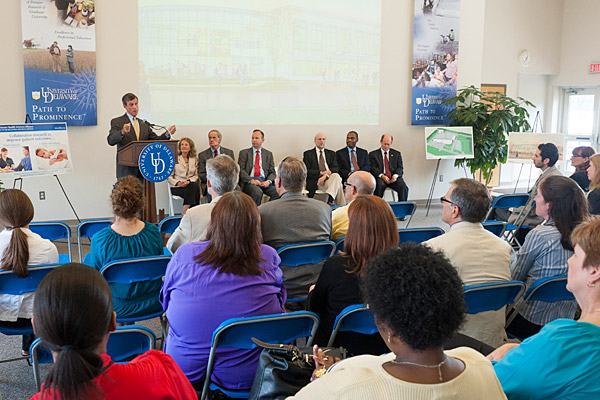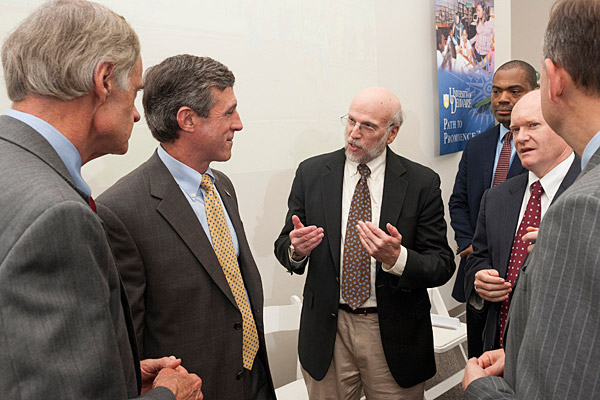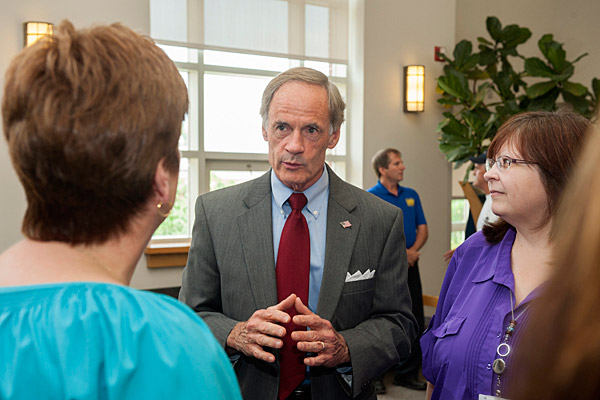


The iron triangle
Grants to improve health care, provide better access at lower cost
1:37 p.m., July 24, 2012--Delaware may be the second smallest state in the nation, but its size is an asset in helping people connect and collaborate so they can compete.
That advantage was evident on Monday, July 23, when Delaware Gov. Jack Markell, U.S. Senators Tom Carper and Chris Coons, and U.S. Rep. John Carney joined teams of academic and clinical researchers and practitioners to celebrate major health care innovation awards to two Delaware hospitals.
Campus Stories
From graduates, faculty
Doctoral hooding
Close to 100 people turned out for the event, which was held at the University of Delaware.
Kathleen Matt, dean of the UD College of Health Sciences and executive director of the Delaware Health Sciences Alliance, welcomed the attendees and congratulated alliance partners Christiana Care Health System and Nemours/Alfred I. duPont Hospital for Children on the grants, which were awarded by the Centers for Medicaid and Medicare Services.
Christiana Care received $10 million for a project focused on cardiovascular disease, while Nemours was awarded almost $3.7 million to investigate childhood asthma.
The research is not about developing better pacemakers or inhalers — instead, it will focus on using existing knowledge to improve patient outcomes and reduce costs.
William Weintraub, M.D., John H. Ammon Chair of Cardiology, will lead the Christiana Care team in creating and testing a system that will use a heart disease “data hub” and case managers to improve care for post-myocardial infarction and revascularization patients.
“Our work through this grant will result in patients experiencing an improved quality of care and an improved quality of life,” said Weintraub, who is also director of the Christiana Care Center for Outcomes Research. “The advantage of our proposal is that it is designed to work with existing hospital and information systems so we can zero in and customize our care of patients in the most efficient and effective manner.”
The Nemours project will foster healthier neighborhoods through partnerships between the children’s hospital and neighborhood leaders that focus on asthma trigger reduction in homes, schools, child care centers, and other community settings. It will also increase coordination of services by integrating care with community support services and local government initiatives to provide healthier environments for children.
“Our ‘medical home’ work will benefit not only the children we see at Nemours but also their neighborhoods and the surrounding population,” said Nemours CEO Kevin Churchwell.
Carper, Coons, Markell, and Carney all stressed that health care costs can be contained only through prevention and more efficient delivery of care.
“Both of these award-winning Delaware programs aim to reduce the cost of care through prevention,” said Carper. “By preventing disease and illness from getting worse or starting in the first place, we can increase Delawareans’ quality of life and bring down the costs of care by reducing expensive emergency room visits and hospital procedures. Programs like these are at the very heart of the Affordable Care Act.”
Markell shared a cautionary tale about the downward spiral that can occur when the working poor experience a health emergency. He cited the example of a single mother living in a mold-infected apartment with a child who has asthma. The unhealthy living conditions and poorly controlled medical condition can lead to emergency room visits, unpaid bills, falling credit scores, rising interest rates, and job loss.
“That’s the cycle we need to break,” he said.
Carney referred to the current cost of health care as “unsustainable and a burden on American businesses and families.”
“The resources announced today will be used to identify and develop best practices for improving patient care while reducing costs,” he added. “Nemours and Christiana Care have developed innovative approaches to accomplishing this goal, and I look forward to their work being used as an example to promote quality, efficient health care nationwide.”
Coons said the funding will give the health care workforce the tools they need to provide more thorough, accurate and efficient care to patients.
“I feel strongly that these programs are worth investing in because the payoff will be huge,” he said. “They will not only save money for years to come, but they will also save lives.”
Matt pointed to the University’s new Science, Technology and Advanced Research (STAR) Campus as the catalyst for enhanced collaborations in the future.
“Right now, DHSA is a virtual organization, but the rollout of the STAR Campus will provide a physical space where we can all work together in creating interprofessional education programs and conducting translational research,” she said.
Article by Diane Kukich
Photos by Evan Krape










